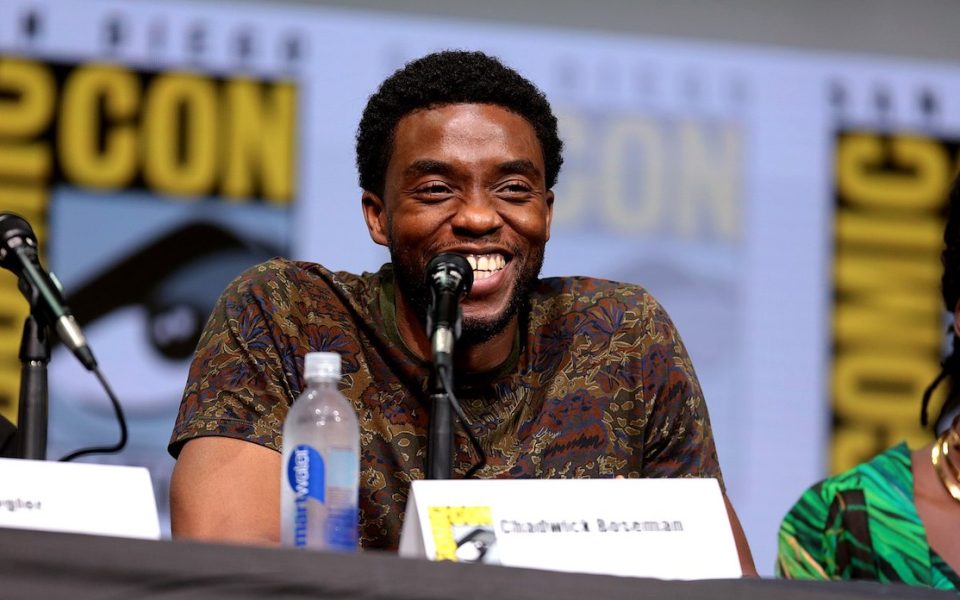Featured image: Chadwick Boseman speaking at the 2017 San Diego Comic Con International, for “Black Panther”, at the San Diego Convention Center in San Diego, California. (photo by Gage Skidmore)
Jermaine Exum breaks it down.
“After much racially-charged taunting from the Red Skull,” he says, “T’Challa made a promise to the Skull that he would break his jaw. He does just that and the Red Skull is defeated in hand to hand combat, not by Captain America, but by the Black Panther.”
Exum, an avid comics reader who has been employed by Acme Comics for 24 years, says his favorite Black Panther story neatly explains why Black Panther is a hero.
The tweet from Chadwick Boseman’s account announcing the actor’s passing on Aug. 28 became the most popular tweet of all time, with more than 5.7 million likes. And Boseman’s death comes during a modern-day civil rights movement.
Boseman had suffered from colon cancer since 2016. Despite being terminally ill, he managed to deliver outstanding performances in films highlighting Black excellence, starring as Jackie Robinson in 42, James Brown in Get on Up and Thurgood Marshall in Marshall. He first appeared as the superhero Black Panther in Captain America: Civil War in 2016, but it was his leading portrayal in Black Panther in 2018 that earned him an NAACP Image Award for Outstanding Actor in a Motion Picture. To his fans everywhere, especially the Black community, his death is somber, but his body of work makes his life worth celebrating.
Marvel moguls Stan Lee and Jack Kirby created Black Panther in 1966 after noticing a lack of Black representation in comics at the time. Black Panther broke barriers during the Civil Rights Movement as the first Black superhero to appear in mainstream American comics.
Many people think he was named after the Black Panther Party — a Black nationalist political party founded that same year — but that was merely a coincidence as he was named after the animal.
Black Panther, aka T’Challa, king and protector of the fictional African nation Wakanda, relies on his strength, wealth and knowledge of technology in battles against his enemies.
The world went into a frenzy when the movie was released. Black people lined up outside theaters dressed in African garb to see an ensemble cast of Black actors portrayed as royalty. They crossed their arms over their chests shouting, “Wakanda forever!”
According to Box Office Mojo, the film grossed more than $1.3 billion worldwide and became the highest grossing film be a Black director. On Sunday night, ABC aired Black Panther with no commercials and was viewed by 6.1 million people, followed by a special honoring Boseman’s life, A Tribute for a King, viewed by 4.7 million. The soundtrack to the film was a success, too, with King’s Dead winning a Grammy for Best Rap Performance.
Black Panther was a role model to children, showing them that they could be superheroes, too.
Nikolaus Knight, a North Carolina A&T alum who now works as a teacher at Dunbar Elementary in Memphis, entered his classroom the following Monday and allowed his students space to process the loss.
He created a PowerPoint template that asked if the kids recognized some pictures of him.
“These slides did not require me to explain what death was or to inform students that he had passed away,” he says.
“It gave everyone, including the teacher, a chance to process their emotions and make the connection between Chadwick and the moments that brought us joy, light, and empowerment.”
He then showed a YouTube video, courtesy of WokeKindergarten, explaining who Boseman was and the different roles he played on- and off-screen. The last slide included the song from the film All the Stars and gave students the chance to share their favorite memory of the superhero. Students’ responses were positive, saying, “I love how he flipped off the car,” or, “I liked that he was bulletproof.” Something one student said stuck with Knight, and that is why he found it so important to include this in his class.
“My favorite thing was that he liked us [Black people].”
To Exum, Black Panther represents the importance of Black characters fiction having unlimited potential, not having to be confined to roles that portray negative stereotypes. When he heard the news, Exum recalls being in a state of shock.

“I didn’t understand what they were telling me,” he says, “but an internet search revealed the news was true.”
He says this loss hurt so much because there was finally someone to fill the big shoes of the Black Panther role, only to lose him to an illness even the Black Panther could not defeat.
“This is a type of loss that I don’t think the world has felt before,” he said. “Yes, actors have died young, but not quite an actor who so exemplified one role of such great importance to so many.”
Exum says Boseman’s death should be viewed as a wake-up call to young adults, and that people should focus on the human, not the role he portrayed.
“Now is not the time to consider how the Marvel Cinematic Universe of movies may continue,” he says. “Now is the time to study Chadwick Boseman’s path to success to see how it may be duplicated. Now is the time to consider the brevity of life and the importance of monitoring health.”
Boseman’s death comes as a crushing blow to those that adored him not only because of what he embodied, but who he was. President Barack Obama shared his thoughts on Twitter about Boseman stating, “To be young, gifted, and Black; to use that power to give them heroes to look up to; to do it all while in pain — what a use of his years.”
Join the First Amendment Society, a membership that goes directly to funding TCB‘s newsroom.
We believe that reporting can save the world.
The TCB First Amendment Society recognizes the vital role of a free, unfettered press with a bundling of local experiences designed to build community, and unique engagements with our newsroom that will help you understand, and shape, local journalism’s critical role in uplifting the people in our cities.
All revenue goes directly into the newsroom as reporters’ salaries and freelance commissions.


Leave a Reply